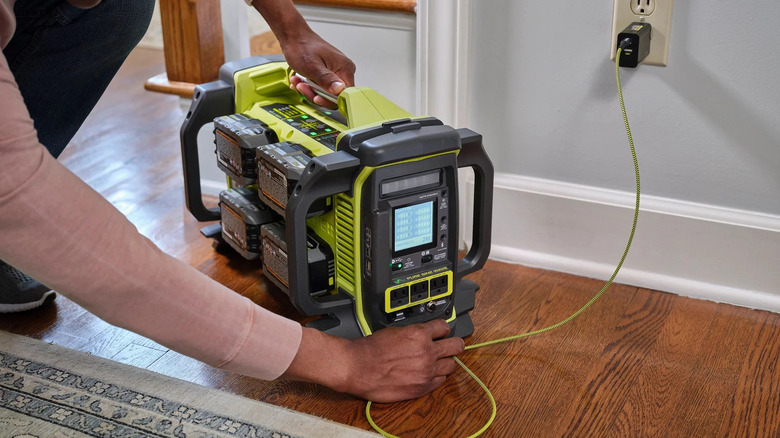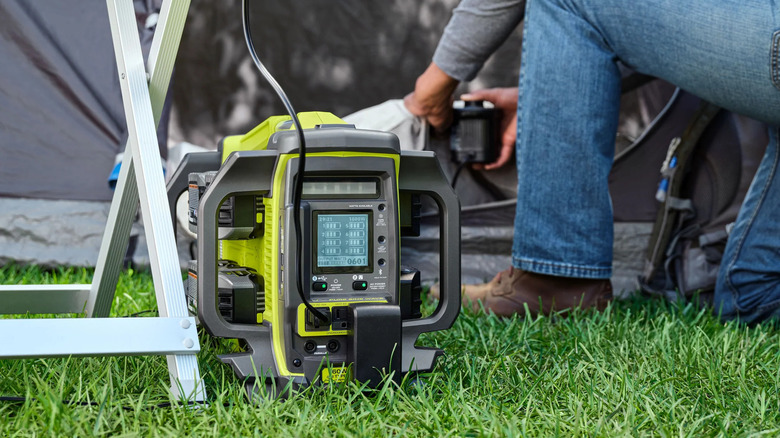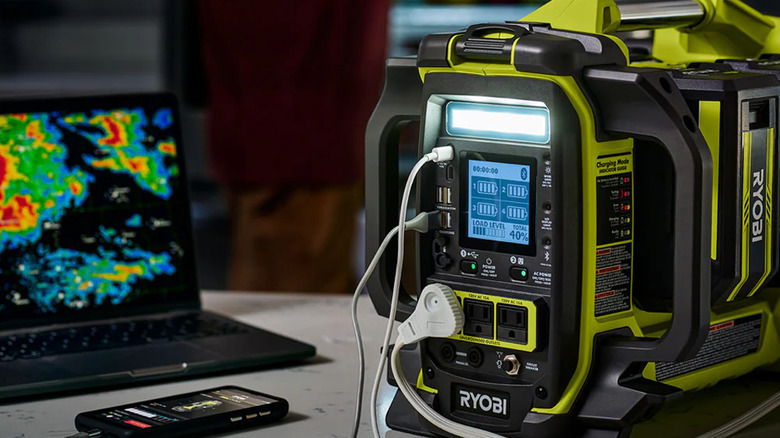Ryobi 18V Vs. 40V Power Station: How Do These Two 1800-Watt Inverters Differ?
When it comes to tool companies, Ryobi is a trusted brand that straddles the line between quality and affordability. From its original blue color to its now-signature green and black with grey accents, the tool manufacturer of Japanese origin has slowly amassed a huge ecosystem of products like hand tools, as well as cordless and corded power tools. It is powered by multiple battery systems, which cater to different consumer needs. Whether you're a landscaper, crafting enthusiast, or a just a tinkerer, Ryobi will likely have something for you.
While Ryobi isn't part of our list of major power station brands, there are plenty of reasons why a Ryobi Power Station can work for you, especially if you're already knee-deep into the Ryobi ecosystem. While it can be a little confusing, Ryobi offers several similar power storage systems, such as its power source and gas-powered generators. However, its power stations are unique in the sense that they can handle power requirements for appliances, like refrigerators and TVs, while still being quiet and fume-free. Although the $1,199 price tag for its most powerful, portable power station can be steep for the average person, Ryobi does offer two other options which are closer to half the price: the ONE+ 18V Power Station and the 40V 1800-Watt Power Station. So, if you're wondering which one to get, here's how they're the same, how they're different, and what users have to say about them.
All you need to know about the Ryobi ONE+ 18V Power Station
Designed for worksites, emergency purposes, and even just casual hang outs in the great outdoors, the Ryobi 18V Power Station is rated to work both inside and outside. For just the tool itself, it retails for $649, but there's also an option to get it in a kit with four 6.0 Ah batteries for $849.
Weighing 24 lbs, this power station uses the 18V ONE+ battery system. Capable of going up to 1,800 running Watts, it has a 60W charging input that can be hooked up to wall plugs, cars, or even solar panels. Apart from its trio of AC 120V output plugs, you also have your pick between four USB-A outlets (two 12V max and two 18v max fast-charging) and two USB-C outlets that can handle up to 45W. Other unique features that set this power station apart from the crowd include how it's safe to use with sensitive gadgets, LCD display, and GENCONTROL app integration. Plus, it lets you charge eight batteries in sequence and boasts hot swap features.
On the official Ryobi website, the 18V ONE+ 1800 Watt Power Station has garnered an average rating of 4.5 stars from 60+ reviewers. It's also good to note that only five people bought it on Amazon and weren't very impressed. Among the chief complaints that dissatisfied customers mentioned include issues with the battery draining and not meeting run time expectations.
What makes the Ryobi 40V 1800-Watt Power Station different
While it shares the 18V ONE+ power station's $649 price tag, the 40V Power Station's $849 kit option has two 6Ah batteries plus a charger and not four 6Ah batteries. Similar to the 18V ONE+ Power Station, the 40V option also shares several of its best features, such as quiet operation, LCD display screens, compatibility with the GENCONTROL App, and Pure Sine Wave Technology. It's also made to work with small electronic devices, such as mobile phones, television sets, and refrigerators.
However, there are a few key differences that set it apart, such as the fact that it's meant primarily for indoor use. If sequential battery charging matters to you, this model can only handle up to four 40V batteries. When it comes to weight, it's not only marginally lighter by half a pound at 23.5 lbs. In terms of output, the 40V PowerStation has the same number of USB-A and USB-C ports, but it does fall short in terms of the fast-charging features. Lastly, Ryobi also mentions that while it can hit a max running of 1,800 watts for up to three minutes, it only guarantees up to 1,600 watts for continuous use. On the official Ryobi website, the 40V Power Station has a generally higher rating of 4.6 stars from 165 reviewers. According to Ryobi, it is also covered with a 5-Year Limited Warranty, which is two more than its 18V offer that only has a 3-Year Limited Warranty.


